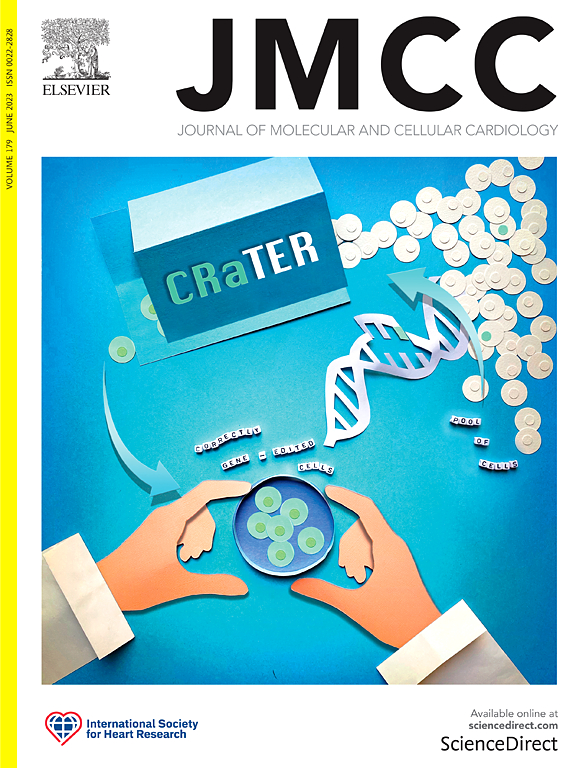TFPI2 hypermethylation promotes diabetic atherosclerosis progression through the Ap2α/PPARγ axis
IF 4.9
2区 医学
Q1 CARDIAC & CARDIOVASCULAR SYSTEMS
引用次数: 0
Abstract
Diabetes mellitus significantly escalates the risk of accelerated atherosclerosis (AS), severely affecting cardiovascular health. Our research, leveraging Gene Expression Omnibus (GEO) database analysis (GSE118481), revealed diminished TFPI2 expression in diabetic patients' atherosclerotic plaques. Further validation in carotid artery plaques and an AS mouse model confirmed TFPI2's reduced expression in diabetes. Through TFPI2 knockdown in non-diabetic mice, we observed aggravated plaque burden and increased inflammatory M1 macrophage polarization. Conversely, TFPI2 overexpression in diabetic mice improved plaque stability and induced reparative M2 macrophage polarization, countering hyperglycemia's negative effects. Mechanistically, transcription factor activator protein 2α (AP-2α) is a repressor of PPPARg transcription, and the interaction of TFPI2 with the transcription factor AP-2α blocks AP-2α binding to the PPARγ gene promoter, which is essential for PPARγ-mediated transcription and the transition from M1 to M2 macrophages. Additionally, hyperglycemia-induced DNA methyltransferase 1 (DNMT1) upregulation heightens TFPI2 methylation, reducing its expression. Our findings spotlight the TFPI2/AP-2α/PPARγ axis as crucial in diabetic AS modulation, proposing its targeting as a new therapeutic strategy to halt diabetes-driven AS progression, highlighting TFPI2's therapeutic promise in addressing diabetes-related cardiovascular issues.

TFPI2高甲基化通过Ap2α/PPARγ轴促进糖尿病动脉粥样硬化进展。
糖尿病显著增加加速动脉粥样硬化(AS)的风险,严重影响心血管健康。我们的研究,利用基因表达综合(GEO)数据库分析(GSE118481),揭示了TFPI2在糖尿病患者动脉粥样硬化斑块中的表达降低。在颈动脉斑块和AS小鼠模型中的进一步验证证实了TFPI2在糖尿病中的表达降低。通过在非糖尿病小鼠中敲低TFPI2,我们观察到斑块负担加重,炎性M1巨噬细胞极化增加。相反,糖尿病小鼠中TFPI2过表达可改善斑块稳定性,诱导修复性M2巨噬细胞极化,抵消高血糖的负面影响。从机制上讲,转录因子激活蛋白2α (AP-2α)是PPPARg转录的抑制因子,TFPI2与转录因子AP-2α的相互作用阻断AP-2α与ppparγ基因启动子的结合,这是ppparγ介导的转录和从M1到M2的巨噬细胞转化所必需的。此外,高血糖诱导的DNA甲基转移酶1 (DNMT1)上调会增加TFPI2甲基化,降低其表达。我们的研究结果表明,TFPI2/AP-2α/PPARγ轴在糖尿病as调节中起着至关重要的作用,提出了其作为一种新的治疗策略来阻止糖尿病驱动的as进展,强调了TFPI2在解决糖尿病相关心血管问题方面的治疗前景。
本文章由计算机程序翻译,如有差异,请以英文原文为准。
求助全文
约1分钟内获得全文
求助全文
来源期刊
CiteScore
10.70
自引率
0.00%
发文量
171
审稿时长
42 days
期刊介绍:
The Journal of Molecular and Cellular Cardiology publishes work advancing knowledge of the mechanisms responsible for both normal and diseased cardiovascular function. To this end papers are published in all relevant areas. These include (but are not limited to): structural biology; genetics; proteomics; morphology; stem cells; molecular biology; metabolism; biophysics; bioengineering; computational modeling and systems analysis; electrophysiology; pharmacology and physiology. Papers are encouraged with both basic and translational approaches. The journal is directed not only to basic scientists but also to clinical cardiologists who wish to follow the rapidly advancing frontiers of basic knowledge of the heart and circulation.

 求助内容:
求助内容: 应助结果提醒方式:
应助结果提醒方式:


